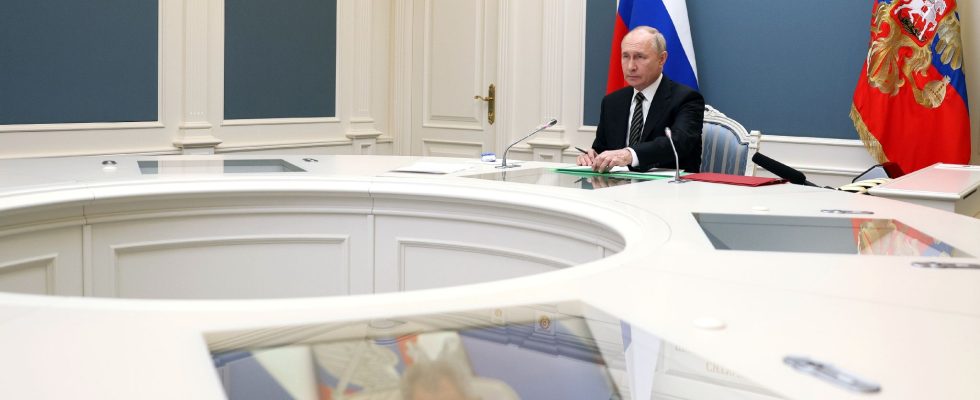“This is our family”, a national competition launched from November 4 in Russia, appears at first glance to be as innocuous as it is apolitical. In a good-natured atmosphere, thousands of families across the country are preparing to compete in different challenges: cooking a dish according to a special recipe, composing a song, preparing a surprise message for Mother’s Day, decorating the house for that of national unity… “The most important thing is that the whole family accomplishes tasks together!” specify the organizers. At the end of the competition, the model families hope to win one of the big prizes: 30 homes worth 5 million rubles (more than 50,000 euros) each, or even 300 trips across the country.
In reality, the competition is a matter of well-considered political communication, aiming to skyrocket the popularity of Vladimir Putin between now and the presidential election of March 17, 2024. In charge, technocrats from the Kremlin, whose mission consists of mobilizing administrative and media resources to favor the presidential party in each electoral race. This event, which highlights conservative values, is one of the many measures to promote the re-election of Vladimir Putin. Since the 2020 amendment to the Russian Constitution, the outgoing president can remain in power until 2036 and, therefore, run for the fifth time since the start of his reign in 2000.
Making people forget the war in Ukraine
If the official announcement of the president’s candidacy has not yet been made, it could take place on the same day as the launch of the “It’s our family” competition and another, equally patriotic event: the Forum exhibitions in Russia. Every year, at VDNKh Park in Moscow, a legendary place of Soviet architecture built by Stalin in 1939, the forum highlights the most important achievements of the country and regions. “It allows Vladimir Putin to promote his mandates,” according to Andreï Pertsev, Russian journalist and political analyst.
The event will be highly publicized and will set the tone for the Kremlin leader’s electoral campaign: a “series of parties” praising the values and superiority of Russia through “the organization of sports forums, meetings with military families and similar events,” continues Andrei Pertsev.
“All while mentioning the situation in Ukraine as little as possible,” continues the political scientist, because Vladimir Putin’s “special military operation” is less and less popular in public debate. Even the opinion polls of the VTsIOM institute, although controlled by the government, struggle to mask war weariness: its director, Valéri Fedorov, estimates that the share of Russians who firmly support the war in Ukraine fluctuates between 10 and 15% only.
Vladimir Putin is well aware of this. He is seeking to regain support by increasing public trips and crowd baths, especially since Yevgeny Prigojine’s mutiny. The Kremlin has also reduced the duration of the quarantine necessary to meet Putin to five days in the run-up to the 2024 presidential election, according to journalist Farida Rustamova. Anyone received by the president had previously had to undergo strict isolation for two weeks before the meeting. This relaxation allows Putin to increase the number of public appearances alongside high-ranking people.
Electronic voting
Certainly, the efforts invested in electoral communication seem quite useless as the results of the vote seem to be known in advance. In June, a presidential administration source even said that they expected Putin to be elected with a “record result” of more than 70% of the vote, with a turnout that would rise more than 80%.
But, as in any authoritarian regime, elections remain a strong means of legitimizing power. To ensure such results, electronic voting, which in Russia considerably facilitates electoral fraud, will be introduced for the first time during a presidential election. “If the State does not yet have the means to extend electronic voting to the entire territory, around thirty large Russian cities will have adopted this method of voting by the time of the election,” specifies journalist Andreï Pertsev.
The opposition’s choice
Last arrangement to be defined: the list of candidates who will oppose Putin on March 17. The president will compete against a series of opponents established in advance by the presidential administration. Among these “false adversaries”, we should find the communist deputy Gennady Zyuganov, the leader of the far-right LDPR party, Leonid Sloutski, and a member of the centrist New People party.
To give the illusion of an indisputable victory, Vladimir Putin also needs to run against a left-liberal candidate who looks like a real opponent. Who to embody this candidate, almost all of the anti-Putin votes having left the country? The Kremlin’s choice would fall on Grigori Yavlinski, member of the Yabloko party, the last anti-war political organization still authorized in the country, who would be the favorite of the presidential administration, as indicated by his visit to the Kremlin on October 26.
“The subject of this meeting may have been Yavlinski’s participation in the presidential election of March 2024 to play the liberal puppet candidate, as Ksenia Sobchak may have been in 2018, and whose main goal is to sow discord in opposition”, estimates Tatiana Kastouéva-Jean, director of the Russia-Eurasia Center at Ifri. According to Andrei Pertsev, Yavlinsky is an ideal choice for power, because he is as old as Putin – as, moreover, all his potential adversaries… Moreover, the age of the Russian president, who celebrated his 71st birthday on the 7th October, “is a thorny problem for the presidential administration, which does not want to put him in competition with younger candidates, likely to embody a renewal”, explains Andreï Pertsev. In this new election, only the age and health of the president therefore seem to represent an obstacle.
.
